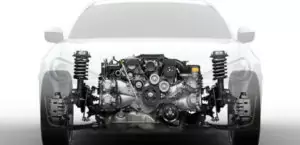The 1.4-liter Volkswagen AKQ 16v gasoline engine was produced from 1997 to 2000 and was installed only on the fourth generation Golf, the similar Bora and the small Lupo. This power unit is a EURO 2 version of the more well-known motor with the AXP index.
The EA111-1.4 series includes: AEX, AKQ, AXP, BBY, BCA, BUD, CGGA, CGGB.
Specifications
| Production years | 1997-2000 |
| Displacement, cc | 1390 |
| Fuel system | injector |
| Power output, hp | 75 |
| Torque output, Nm | 126 |
| Cylinder block | aluminum R4 |
| Block head | aluminum 16v |
| Cylinder bore, mm | 76.5 |
| Piston stroke, mm | 75.6 |
| Compression ratio | 10.5 |
| Features | DOHC |
| Hydraulic lifters | yes |
| Timing drive | 2 belts |
| Phase regulator | no |
| Turbocharging | no |
| Recommended engine oil | 5W-30 |
| Engine oil capacity, liter | 3.2 |
| Fuel type | petrol |
| Euro standards | EURO 2 |
| Fuel consumption, L/100 km (for VW Golf 4 2001) — city — highway — combined |
8.5 5.4 6.5 |
| Engine lifespan, km | ~250 000 |
The engine was installed on:
- Volkswagen Bora 1 (1J) in 1998 – 2000;
- Volkswagen Golf 4 (1J) in 1997 – 2000;
- Volkswagen Lupo 1 (6X) in 1998 – 2000.
Disadvantages of the VW AKQ engine
- On specialized forums, this unit is often scolded for its low reliability and noisy operation.
- The most problems for owners are caused by malfunctions of the throttle assembly.
- Due to freezing of the crankcase ventilation in winter, oil is often squeezed out through the dipstick.
- Monitor the condition of the timing belts: the resource is low, and when they break, the valves bend.
- On a run of more than 100,000 km, rings often lie and oil consumption appears.






